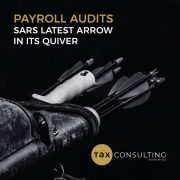NEWS | SARS CAN MAKE YOU PICK UP THE TAB OF YOUR OWN AUDIT
For those who have been subjected to a SARS audit, it may be hard to imagine a reality where this experience can be any more agonising. If this resonates with you, perhaps consider a world where SARS makes you pay for the resources it had to expend in putting you through this ordeal. The truth […]










